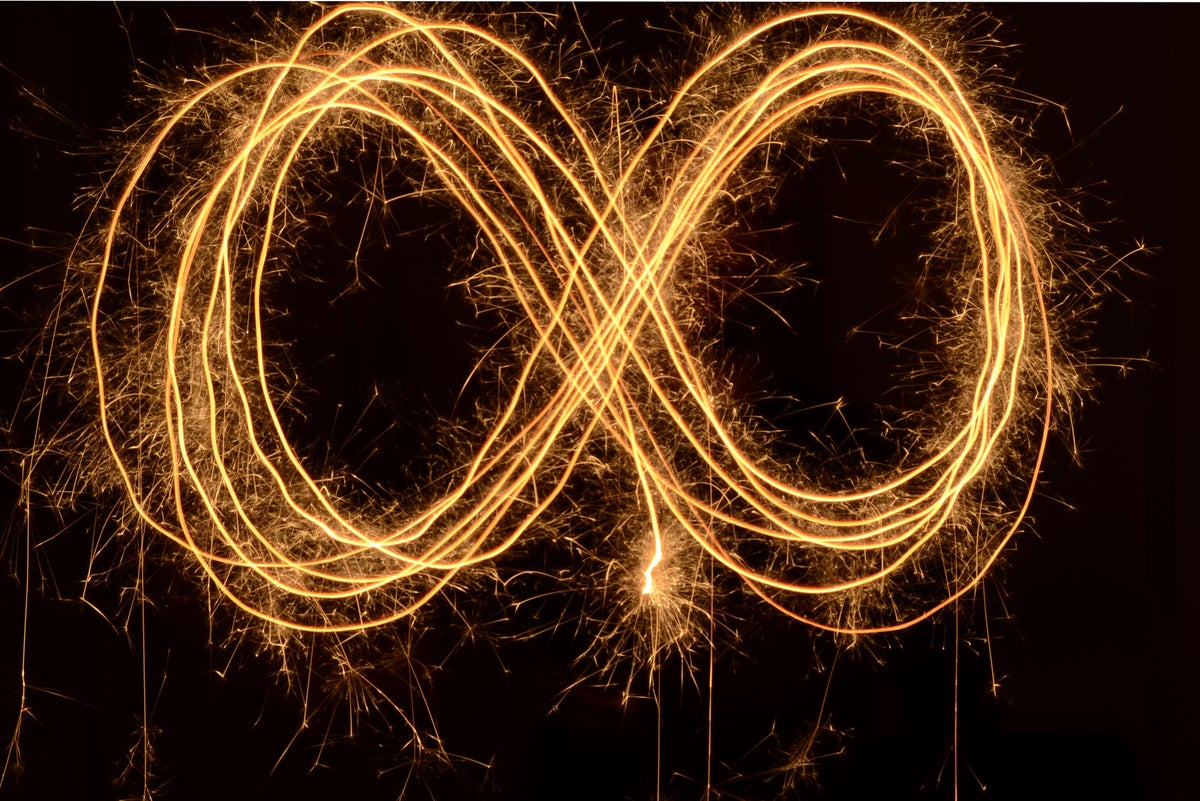You are stuck on Christian theology of creation. I do not find it interesting.Use any arbitrary unit of time you want, and explain precisely how we managed to pass through an infinite amount time units in order to arrive at today.
You are using an out of date browser. It may not display this or other websites correctly.
You should upgrade or use an alternative browser.
You should upgrade or use an alternative browser.
If the universe is infinitely old, how did Today ever get here?
- Thread starter Cypress
- Start date
So if you can't explain how we passed through an infinite amount of time to arrive at today, this is indeed a problem that's hard to understand, despite your claim that it's not.You are stuck on Christian theology of creation. I do not find it interesting.
I have no idea what "passed through an infinite amount of time" means.So if you can't explain how we passed through an infinite amount of time to arrive at today, this is indeed a problem that's hard to understand, despite your claim that it's not.
Yes you do.I have no idea what "passed through an infinite amount of time" means.
Anyone who is actually interested in truth has to either be able to logically explain how there could have been an infinite amount of time before today, or step back and reconsider their belief in an eternal universe.
I lean towards the understanding that because today exists, that implies a finite age of the universe and an origin point.
I'm willing to hear the explanation for this paradox of an infinitely old universe, but no credible answers have been forthcoming.
I am not saying the universe has the measure of infinity. I am saying time does not precede the existence of the universe. You think God caused the universe. It is just a belief with no empirical evidence.Yes you do.
Anyone who is actually interested in truth has to either be able to logically explain how there could have been an infinite amount of time before today, or step back an reconsider their belief in an eternal universe.
I lean towards the understanding that today exists, that implies a finite age of the universe and an origin point.
I'm willing to hear the explanation for this paradox of an infinitely old universe, but to credible answers have been forthcoming.
I really do not. Leibniz ridiculed this idea of the universe moving in time.Yes you do.
Then it should be easy for you to explain exactly how we went through an infinite amount of days in order to get to today.
That is a question that sounds like a conundrum but is it really? If it is infinite then being present on ANY given day is equally "likely" or "unlikely".
Today is just as likely to be a time you exist in as Day 1.
If time didn't exist then the universe isn't eternal or infinitely old.I am not saying the universe has the measure of infinity. I am saying time does not precede the existence of the universe. You think God caused the universe. It is just a belief with no empirical evidence.
Saying time didn't exist before the Big Bang is the same thing as saying the universe is finite in age and has a temporal origin point. Why even try to dance around and avoid reaching this perfectly rational conclusion?
The closest I can come to making Infinity conform to a finite value, are the mathematical limits we saw in precalculus. But even limits to infinity only approach infinity asymptomatically. Infinity is always undefined and uncountable.

Strange but True: Infinity Comes in Different Sizes
If you were counting on infinity being absolute, your number's up
Into the Night
Verified User
This is known as the Theory of the Continuum. It's not a new theory. It was developed by some ancient Greeks that didn't agree with Aristotle, and by ancient Israel. There are some indications the ancient Egyptians had a form of this theory as well, despite their stories about Ra and other numerous gods.Universe May Have Had No Beginning
If a new theory turns out to be true, the universe may not have started with a bang.
In the new formulation, the universe was never a singularity, or an infinitely small and infinitely dense point of matter. In fact, the universe may have no beginning at all.
He didn't create it, but he at least published it again."Our theory suggests that the age of the universe could be infinite," said study co-author Saurya Das, a theoretical physicist at the University of Lethbridge in Alberta, Canada.
So such is his belief. Nothing to do with science.Steady State Theory's View on the Universe's Origins and Age
The Steady State Theory posits that the universe is eternal, with no beginning or end. This theory rejects the idea of a singular cosmic origination event, such as the Big Bang, and instead suggests that the universe is constantly evolving through the continuous creation of matter. The universe's age is not a fixed value, as it is considered to be infinitely old.
https://www.livescience.com/49958-theory-no-big-bang.html
Neither the Theory of the Continuum nor the Theory of the Big Bang are science.
Into the Night
Verified User
Who says God created it? How can any god or gods create a universe without being in the thing they are creating?? If they exist 'outside' the 'universe', then it isn't a universe, by definition.This is how Aquinas' First Uncaused Cause fails.
Ultimately there is no "superior" hypothesis for the origin of the universe. Either one believes in an eternal "God" or one believes in an eternal "Universe" which does not require a God to create it.
Here you are correct.I think one can truly be "agnostic" about the origin of the universe. Since it may very well be possible that it is impossible to know the answer.
If Jesus Christ came up to you and shook your hand and told you who He was, would you believe Him?I see agnosticism about God to be far more "tentative". Since presumably if God is real then God's existence CAN be known one way or the other.
Into the Night
Verified User
Of course, the universe doesn't have days OR nights! It simply exists.If the universe is infinitely old (or young), then there are only three 'days' to it:
Today
Tomorrow
Yesterday
Perhaps you are searching for:
Before now.
Now.
After now.
Into the Night
Verified User
The universe has no day or night.It seems to me if the universe was infinetly old, there would always be at least one more day before today ever got here.
Into the Night
Verified User
Speed is not a dimension. What is expanding? The universe has no known boundary. What would you call the 'center' of something that has no known boundary??It's another theory, like the Big Bang - and we will likely never know for sure. The reason the Big Bang makes more sense to me is the speed the universe is expanding. Guess how fast our galaxy, The Milky Way, is traveling right now away from the theorized, "Big Bang center".
Into the Night
Verified User
...such as?Big Bang is generally supported by strong evidence.
What 'origin'? Where is the 'center' of something that has no known boundary??Before the Big Bang became widely accepted Einstein, Fred Hoyle, and other physicists generally wanted to believe the universe was eternal and they did not want to believe it had an origin.
The universe has no days or nights.I can't wrap my mind around the premise that if the universe is infinitely old how today ever got here.
Into the Night
Verified User
The 2nd law of thermodynamics states: e(t+1) >= e(t). That means entropy either increases or STAYS THE SAME. It can never decrease in any given system (including the entire known universe).A Mobius strip implies time is cyclical and has a periodicity.
Unlike the other mathematical laws of physics, entropy is unidirectional at the scale of the cosmos, and consequently there is an arrow of time - it goes in one direction, and is not cyclical.
Into the Night
Verified User
Entropy has no cycle.Entropy can be applied to a cyclic process so long as the result is zero at the end of the cycle. In a universe billions of years old, that could be occurring and we just haven't noticed.

2.6: The Entropy
phys.libretexts.org
Entropy, as I've demonstrated, can by cyclic so long as overall it equals zero at the end of each cycle.
Into the Night
Verified User
What you are describing then is not a universe, by definition.Even a Mobius strip has ONE boundary,
and something has to exist outside of every boundary.
Maybe, something existing outside of the boundary
serves as the time reference rather than whatever cyclical manifestation exists inside.
Also, if entropy implies random and disordered,
how does something as orderly as a straight arrow of time emerge from an entropic manifestation?
I'm sure that these questions are nonsense to a mathematically oriented mind,
but despite being all about numbers,
accounting as I knew it didn't require much challenging math.
The numbers were easy to make functional.
My personal account balances meant that I shouldn't try to buy a new Bentley
if I wanted to send my kids to college.
Into the Night
Verified User
Nice way to put it!If the set of all real numbers is infinite, how do you wrap your head around the number five being the number of fingers you have on one hand?
Into the Night
Verified User
Zero is always the origin, even in a system containing an infinite number of real numbers or an infinite number of positive integers.Five is only five integers from the origin point of natural numbers, if we take zero as an origin. That's finite.
Which is just another way of saying that time has no meaning.An infinitely old universe from our perspective does not have a finite amount of measurement units back to an origin. There is no origin. There should be an infinite amount of time units between us and the past.
Entropy stays the same, and the 2nd law of thermodynamics is still fulfilled. There is no flow of energy or even a dissipation of energy possible in a universe that has no boundary.
It's just the same energy potential over an infinite volume.
So time has no significant meaning at all.
Time has meaning only to things like the cyclic events of a planet, life and death, etc.
We bother to measure time on Earth because there is a limited time between birth and death.
Outside those boundaries, time has no meaning.
